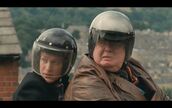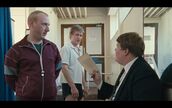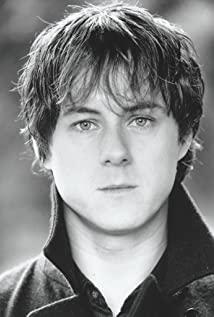Will anyone come to my funeral?
Will they come to my funeral, I wonder?
Does everyone have a successful career? And what will they be?
Akart, what are you doing? Akhtar, what are you?
A Chancellor in Casey, near the University of Bradford
A headmaster, Miss. In Keighley, near Bradford.
I know someone who became a petty judge
One of you is a magistrate, I know.
Timms, how about you? - I run a chain of dry cleaners
And, Timms, what are you? - Chain of dry-cleaners, Miss.
drug use on weekends
And I take drugs at the weekend.
Are you all happy?
And are you all happy? - (murmurs of agreement)
But the kids won't help
Kids don't help, though, Miss.
Dakin, you're happy, I'm sure.
- Daken, I know you're happy. - Of course.
Of course I'm happy. I'm a tax lawyer. Money's incredible.
I have a lot of money to be a tax lawyer
For fuck's sake!
Whether you know it or not, what Wittgenstein said
Despite knowing, along with Wittgenstein,
the world is everything
that the world is everything that is the case,
Lieutenant James Lockwood, 1st Battalion, Bluecaster Regiment, York
Lieutenant James Lockwood of the First Battalion York and Lancaster Regiment,
Injured by friendly forces
is wounded by friendly fire
Died on the way to the hospital
and dies on his way to hospital.
Only 28 years old He is 28.
Tout comprendre, c'est tout pardonner.
- Rudge, I'd forgotten you. - As usual, Miss. - Rudge, I'd forgotten you. - As usual, Miss.
You're a renovation worker laying carpet in a small house
You're a builder. Carpeting the Dales in handy homes.
Logy Properties shellless snails are affordable
Rudge homes are at least affordable homes for the first-time buyer.
I took a housewife on a tour of the sample house
I take wives around the showhouse.
Tell them I've read Oxford and fucked a lot of women
I tell them I was at Oxford. I get fucks galore.
There's also a reporter who writes a good article, just in more style
There is one journalist, though on a better class of paper -a career he's always threatening to abandon in order, as he puts it, "really to write".
He threatened to give up the profession for real writing
- Hector always says I'm a reporter - you are
Hector always said I was a journalist.
And so you were. School was just an apprenticeship for television.
Going to school is just being an apprentice for TV
I like your show but see a lot of news instead of history
I enjoy your programs, but they're more... journalism than history.
(murmuring)
All Hector's Boys
But of all Hector's boys,
Only one person remembers everything
there is only one who truly took everything to heart,
remembered everything he was taught
remembers everything he was ever taught.
those songs and poems proverbs and endings
The songs, the poems, the sayings, the endings.
Hector's words are never forgotten
The words of Hector never forgotten.
I'm a little surprised that I ended up being a teacher like you
Slightly to my surprise, I've ended up, like you, a teacher.
I'm a bit of a stock figure. I do a wonderful school play, for instance.
I became a benchmark, for example, I excelled in school
Even though I never touch boys, there's always a struggle
And though I never touch the boys, it's always a struggle.
Or that's why I'm a good teacher
But maybe that's why I'm a good teacher.
I'm not happy but I'm not sad
I'm not happy, but I'm not unhappy about it.
He was a good man but I don't think there can be any more teachings like his. He was a good man.
But I don't think there's time for his kind of teaching any more.
It's the only meaningful education other than love
(Hector) No. Love apart, it is the only education worth having.
Passing Thoughts Sometimes it's the only thing you can do
Pass the parcel. That's sometimes all you can do.
Accept it, feel it, and pass it on from generation to generation
Take it, feel it, and pass it on.
Pass it on, kids, this is the game I want you to learn
Pass it on, boys - that's the game I want you to learn.
Pass it on.
Tell them I've read Oxford and fucked a lot of women
I tell them I was at Oxford. I get fucks galore.
There's also a reporter who writes a good article, just in more style
There is one journalist, though on a better class of paper -
A career he's always threatening to abandon in order, as he puts it, "really to write".
- Hector always says I'm a reporter - you are
Hector always said I was a journalist.
And so you were. School was just an apprenticeship for television.
Going to school is just being an apprentice for TV
I like your show but see a lot of news instead of history
I enjoy your programmes, but they're more... journalism than history.
(murmuring)
All Hector's Boys
But of all Hector's boys,
Only one person remembers everything
there is only one who truly took everything to heart,
remembered everything he was taught
remembers everything he was ever taught.
those songs and poems proverbs and endings
The songs, the poems, the sayings, the endings.
Long Yingtai:
"If, when we were twelve years old, there were also flaming phoenix flowers outside the window, fish and shrimp were still playing in the water, and wild snakes slowly crawled along the tropical ivy, and then lay on the rocks. Let's bask in the sun, if we have such a very old soul, sitting on the podium, and saying this to us in a warm and calm voice:
'Children, if you are twelve years old today, if you meet again in forty years, you will find that out of fifty of you, two will suffer from major depression, two will die of illness or accident, Five people are still struggling with food and clothing every day, one third feel that their marriage is not very happy, one person will commit suicide, and two people suffer from cancer.
Among the four of you, the brightest and best children today, two will become doctors or engineers or businessmen, and the other two will spend their lives in misery and hardship. All others, go through marriage, childbirth, work, retirement, and life consists of a touch of sadness and a touch of happiness, living each day with little anticipation, occasional excitement, and silent disappointment, and then with a kind of Want to say but can't say "understand", make the final turn and leave. "
In real life, everyone has a competitive and multi-faceted character and behavior. It's not to clean up Hector, but he also has his depression, sadness and cuteness. The script chose to use his 'hobby' to show the helplessness of the elderly gays of that era, which is actually an artistic and realistic consideration.
Unlike the Dead Poets Society-style struggle, the real passion doesn't mention literature or words, but withdraws the edge outwards and always the struggle inwardly. Those who are silent will move from generation to generation.
[No.1] Lullaby By WHAuden
Lay your sleeping head, my love,
Human on my faithless arm;
Time and fevers burn away
Individual beauty from
Thoughtful children, and the grave
Proves the child ephemeral:
But in my arms till break of day
Let the living creature lie,
Mortal, guilty, but to me
The entirely beautiful.
Soul and body have no bounds:
To lovers as they lie upon
Her tolerant enchanted slope
In their ordinary swoon,
Grave the vision Venus sends
Of supernatural sympathy,
Universal love and hope;
While an abstract insight wakes
Among the glaciers and the rocks
The hermit's carnal ecstasy.
Certainty, fidelity
On the stroke of midnight pass
Like vibrations of a bell
And fashionable madmen raise
Their pedantic boring cry:
Every farthing cost,
All the dreaded cards foretell,
Shall be paid, but from this night
Not a whisper, not a thought,
Not a kiss nor look be lost.
Beauty, midnight, vision dies:
Let the winds of dawn that blow
Softly round your dreaming head
Such a day of welcome show
Eye and knocking heart may bless,
Find our mortal world enough;
Noons of dryness find you fed
By the involuntary powers,
Nights of insult let you pass
Watched by every human love.
Lullaby translated by Xue Zhou
Put down your sleeping head, my love,
In the arms of my betrayal:
Time and fever burned
individual beauty, from
Pensive child, grave
Prove the short life of that child:
But before the dawn, let the only survivors
lying in my arms,
Ordinary, guilty, to me
It is utterly beautiful.
Lovers have no boundaries between soul and body:
when they lay
the usual intoxication
Enchanted slopes of tolerance,
Remember that Venus sent it
supernatural compassion,
and universal illusions of love and hope;
when an abstract epiphany
from glaciers and rocks
Awaken the worldly frenzy of the hermit.
certainty, and loyalty
walk away at the stroke of midnight
vibrating like a bell
hipster maniac raised
Their bookish annoying shouts:
Every dharma lost must be repaid.
All horrific solitaire prophecies are to be fulfilled.
but not from this night
Nor a whisper, a thought
Not a kiss, not a missed glance.
Beauty, Midnight, Vision will all die:
Let the wind of dawn blow
softly wraps around your dreaming head
Such a welcome day shows
Eyes and throbbing hearts may bless,
It is enough to discover our ordinary world;
dry noon you are fed
by an inadvertent force,
Night of Abuse allows you to pass
Under the gaze of every pair of lovers in the world.
[No.2] Musée des Beaux Arts By WH Auden
About suffering they were never wrong,
The Old Masters; how well, they understood
Its human position; how it takes place
While someone else is eating or opening a window or just walking dully along;
How, when the aged are reverently, passionately waiting
For the miraculous birth, there always must be
Children who did not specially want it to happen, skating
On a pond at the edge of the wood:
They never forgot
That even the dreadful martyrdom must run its course
Anyhow in a corner, some untidy spot
Where the dogs go on with their doggy life and the torturer's horse
Scratches its innocent behind on a tree.
In Breughel's Icarus, for instance: how everything turns away
Quite leisurely from the disaster; the ploughman may
Have heard the splash, the forsaken cry,
But for him it was not an important failure; the sun shone
As it had to on the white legs disappearing into the green
Water; and the expensive delicate ship that must have seen
Something amazing, a boy falling out of the sky,
had somewhere to get to and sailed calmly on.
Translated by Zha Liangzheng, Art Museum
They are always clear about suffering,
These classical painters: how well they knew it was
A place in the heart of man, knowing that pain will arise,
While others are eating, opening windows, or taking a boring walk;
Knowing that when the elderly wait eagerly and reverently
When a miraculous is born, there will always be some children
don't particularly want him to appear, but in
Ice skating on the pond at the edge of the woods.
They never forget:
Even tragic martyrdom will come to an end
In a corner, a messy place,
where the dog continues to live the dog's life, and the persecutor's horse
Rub the ignorant hips against the tree.
In Bruegel's Icarus, for example;
With what ease all turned away from that disaster:
The farmer may have heard the sound of falling water and the cry of despair,
But for him it was not a great failure;
The sun still falls on the white legs into the green waves;
The rich and delicate ship must have seen
A strange thing, a boy fell from the sky,
But it has somewhere to go and still sails quietly.
Translated by Yu Guang of the Art Museum
When it comes to suffering, they are never wrong,
The ancient masters: they deeply recognized
The place of suffering in the world; when suffering comes,
Others are always eating or opening windows or just passing silently;
When the elder is waiting reverently and enthusiastically,
When the miracle comes, there will always be children
Don't particularly expect it to happen, just happens to be
Skating on a pond by the woods:
Masters never forget
Even terrible martyrdom must be in the corner
Do it alone, in a cluttered corner
As a dog lived his life as a dog, the horse of a cruel officer
Rub an innocent backside against a tree trunk.
For example, Brugo's "Icaris", everyone
They are all leisurely disregarding the catastrophe, the farmer may
Hearing the splashing water, calling for help hopeless,
But don't let it be a heavy sacrifice; the sun shines,
Will not fail to see the white legs submerged in Bi Zhan
the waves of the sea; the luxurious and elegant boat must see
A wonderful scene, a boy descended from the sky,
But there is still a way to rush, still sailing forward peacefully.
ABOUT THE POEM:
meaning:
The basic premise of the poem is response to tragedy, or as the song goes "Obla Di, Obla Da, Life Goes On." The title refers to the Museum of Fine Arts in Brussels. Auden visited the museum in 1938 and viewed the painting by Brueghel, which the poem is basically about. Generalizing at first, and then going into specifics the poem theme is the apathy with which humans view individual suffering.
Auden wrote that "In so far as poetry, or any of the arts, can be said to have an ulterior purpose, it is, by telling the truth, to disenchant and disintoxicate."
The poem juxtaposes ordinary events and exraordinary ones, although extraordinary events seem to deflate to everyday ones with his descriptions. Life goes on while a "miraculous birth occurs", but also while "the disaster" of Icarus's death happens.
background info:
For those cultural barbarians who don't know the story of Icarus, here it is, in condensed form. Icarus was a Greek mythological figure, also known as the son of Daedalus (famous for the Labyrinth of Crete). Now Icarus and his dad were stuck in Crete, because the King of Crete wouldn't let them leave. Daedalus made some wings for the both of them and gave his son instruction on how to fly (not too close to the sea, the water will soak the wings, and not too close to the sky, the sun will melt them. Icarus, however, appeared to be obstinate and did fly to close to the sun. This caused the wax that held his wings to his body to melt. Icarus crashed into the sea and died.
hints:
Some have even claimed to find hints of Auden's eventual reconversion to Christiantiy in the poem. Richard Johnson, author of "Man's Place: An Essay on Auden", believes there is a touch of Christian awareness in the poem, especially the timeline. The reader of the poem is placed in front of the Breughel painting in a museum, and at the same time is expected to project those images and truths to the world outside. There is also a sort of continuity through the poem as you read it and are allowed to see what the poet means. This allows a reader to become aware of his human position.
The poem first discusses a "miraculous birth", and at the end "the tragedy" of a death. The theme in the poem is human suffering. If you add these things together, and stir really well you might even get some hints at religion , mainly at Christianity
Also, the poem suggest a religious acceptance of suffering (example: eating your morning breakfast while watching coverage of a serious trainwreck on CNN). Religious acceptance basically means coming to terms with the ways of the world.
[No.3] Shropshire Boys - A SHROPSHIRE LAD
XXXI. "On Wenlock Edge the wood's in trouble..."
by AE Housman (1859-1936)
On Wenlock Edge the wood's in trouble;
His forest fleece the Wrekin heaves;
The gale, it plies the saplings double,
And thick on Severn snow the leaves.
'Twould blow like this through holt and hanger
When Uricon the city stood:
'Tis the old wind in the old anger,
But then it threshed another wood.
Then, 'twas before my time, the Roman
At yonder heaving hill would stare:
The blood that warms as English yeoman,
The thoughts that hurt him, they were there.
There, like the wind through woods in riot,
Through him the gale of life blew high;
The tree of man was never quiet:
Then 'twas the Roman, now 'tis I.
The gale, it plies the saplings double,
It blows so hard, 'twill soon be gone:
Today the Roman and his trouble
Are ashes under Uricon.
About AEHousman:
Alfred Edward Housman was born in a village in rural Shropshire, England in 1859. As a student at Oxford, he distinguished himself as a promising scholar of classics, though crises of a personal nature caused him to fail his final exams. Housman was determined to overcome this failing. When not working at the British Patent office Housman wrote scholarly articles, and published many of them to very high regard from those in academic circles. He was invited to teach at the University of London as a professor of Latin, and soon stepped up to Cambridge University, to retire to the life of a shy academic. He published only two volumes of poetry --A Shropshire Lad in 1898 and Last Poems in 1922 -- yet these were instantly and enormously popular. However successful he was, the tone of his poems remained that of the Latin poets he admired:that life is short and often, inexplicably, comes to a bad end.
In addition, Yu Dafu also mentioned A Shropshire Lad more than 80 years ago:
Ah, last June outside the bustling city of Shanghai, by the bustling Huangpu River, I was reciting the words from Housman's A Shropshire Lad.
Come you home a hero
Or come not home at all,
The lads you leave will mind You
Till Ludlow tower shall fall
With a few clear poems, while staring blankly at the dark and turbid water in the river, he sighed a lot and shed a lot of tears. If you knew the desperation I felt at that time, I don't think you would have sent me the slightly resentful letters from last year. ——Ah, I remembered, you don’t understand English, so I’ll translate these poems for you by the way.
"You shall return home in fine clothes,
Otherwise never return,
Say goodbye to the children of your future
Saw La Drota destroyed. "
Excerpted from: "Tanpa" (Originally published in "Creation Quarterly", Volume 2, No. 1, May 1, 1923, according to "Duff's Short Story Collection" Volume 1)
[No.4] Drummer Hodge by Thomas Hardy
They throw in Drummer Hodge, to rest
Uncoffined – just as found:
His landmark is a kopje-crest
That breaks the veldt around;
And foreign constellations west
Each night above his mound.
Young Hodge the Drummer never knew –
Fresh from his Wessex home –
The meaning of the broad Karoo,
The Bush, the dusty loam,
And why uprose to nightly view
Strange stars amid the gloam.
Yet portion of that unknown plain
Will Hodge forever be;
His homely Northern breast and brain
Grow to some Southern tree,
And strange-eyed constellation reign
His stars eternally.
Translated by Drummer Hodge Lu Zhilu
Drummer Hodge was thrown into the pit and buried,
As found, there is no coffin:
His grave is a hill in South Africa,
tear the surrounding plain a little;
Every night above this tomb,
Exotic constellations spread out to the west.
Just came here from home in Wessex,
Young drummer Hodge couldn't understand,
Bushes, fertile soil and dust,
What is the significance of the vast arid plateau?
The dark night is vast,
The twinkling constellations are strange.
It is the corner of this nameless plain,
Hodge will sleep forever and never leave;
He will grow into a great tree in the south,
With the simple mind and heart of the north,
Let the stars twinkle with strange eyes,
rule his destiny forever.
[No.5] The Untold Want By Walt Whitman (1819–1892) Leaves of Grass
THE untold want, by life and land ne'er granted,
Now, Voyager, sail thou forth, to seek and find.
[No.6] MCMXIV by Philip Larkin
Those long uneven lines
Standing as patiently
As if they were stretched outside
The Oval or Villa Park
The crowns of hats the sun
On moustached archaic faces
Grinning as if it were all
An August bank holiday lark;
And the shut shops the bleached
Established names on the sunblinds
The farthings and sovereigns
Adn dark-clothed children at play
Called after kings and queens
The tin advertisements
For cocoa and twist and the pubs
Wide open all day;
And the countryside ont caring:
The place-names all hazed over
With flowering grasses and fields
Shadowing Domesday lines
Under wheat's restless silence;
The differently-dressed servants
With tiny rooms in huge houses
The dust behind limousines;
Never such innocence
Never before or since
As changed itself to past
Without a word—the men
Leaving the gardens tidy
The thousands of marriages
Lasting a littlewhile longer:
Never such innocence again.
View more about The History Boys reviews











